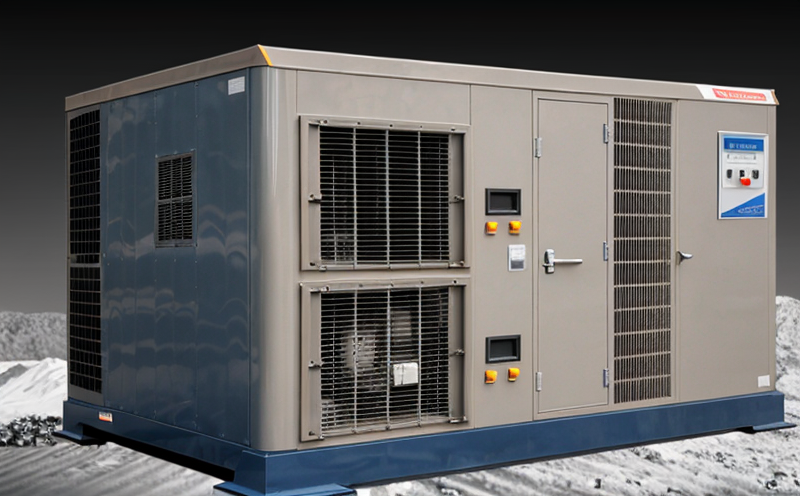ASTM E258 Thermal Mass Characterization Testing
The ASTM E258 thermal mass characterization testing is a critical procedure used to determine the thermal properties of materials and components, particularly in semiconductor and microchip manufacturing. This testing method quantifies how heat is absorbed, stored, and dissipated by materials under specific conditions, providing essential data for design optimization and quality assurance.
The ASTM E258 test involves subjecting specimens to controlled temperature changes while measuring the resulting thermal response. The procedure requires precise control of environmental parameters such as humidity, temperature, and airflow to ensure accurate results. Specimens are typically small samples that represent the larger components being tested. These tests help identify materials with optimal thermal performance for use in high-temperature applications.
The testing process is designed to simulate real-world conditions where thermal mass plays a crucial role in component reliability and efficiency. For instance, in semiconductor manufacturing, understanding how different materials behave under heat stress can significantly impact the lifespan of microchips and other electronic components. The ASTM E258 test helps manufacturers make informed decisions about material selection by providing detailed insights into thermal properties.
Instrumentation for ASTM E258 testing includes advanced calorimeters capable of measuring small amounts of energy as they are absorbed or released during temperature changes. These instruments must be calibrated regularly to maintain accuracy. The testing process also involves rigorous specimen preparation, which may include cleaning, conditioning, and ensuring the integrity of the sample.
ASTM E258 is particularly useful in applications requiring precise control over thermal mass, such as power electronics, automotive systems, and aerospace components. By understanding how materials respond to temperature fluctuations, engineers can design more efficient and reliable systems that meet stringent industry standards.
| Aplied Standards | Details |
|---|---|
| ASTM E258 | Standard Practice for Determining the Heat Capacity of Solids at Elevated Temperatures by Means of Rapid Heating. |
| ISO 9712 | Non-destructive testing – Qualification and certification of personnel performing non-destructive testing methods. |
The ASTM E258 test results are typically reported in terms of heat capacity, thermal conductivity, and specific heat. These parameters provide valuable information for material selection and design optimization. The data generated by this test can be used to improve the performance of semiconductor devices, enhance energy efficiency, and extend product lifespans.
In summary, ASTM E258 testing is a vital tool in the semiconductor industry, offering precise measurements of thermal properties that are essential for ensuring high-quality products. This method ensures compliance with international standards while providing valuable insights into material behavior under heat stress conditions.
Applied Standards
| Aplied Standards | Details |
|---|---|
| ASTM E258 | Standard Practice for Determining the Heat Capacity of Solids at Elevated Temperatures by Means of Rapid Heating. |
| ISO 9712 | Non-destructive testing – Qualification and certification of personnel performing non-destructive testing methods. |
The ASTM E258 thermal mass characterization test adheres to strict standards that ensure accuracy and reliability. The method is widely recognized in the semiconductor industry for its ability to provide precise measurements of heat capacity at elevated temperatures. This standard is crucial for ensuring consistent results across different laboratories and facilities.
ISO 9712, which focuses on non-destructive testing qualifications, complements ASTM E258 by establishing best practices for personnel involved in thermal mass characterization tests. By adhering to these standards, laboratories can maintain high levels of expertise and accuracy when performing ASTM E258 tests.
The combination of these standards ensures that the results from ASTM E258 testing are both accurate and consistent, allowing manufacturers to make informed decisions about material selection and design optimization.
Environmental and Sustainability Contributions
- ASTM E258 helps in reducing waste by ensuring that materials used in semiconductor manufacturing meet strict thermal performance criteria.
- The test promotes energy efficiency by identifying materials with optimal thermal properties, leading to more efficient electronic components.
- This testing method supports sustainability initiatives by enabling the development of longer-lasting and more reliable products.
By using ASTM E258, manufacturers can contribute positively to environmental conservation efforts. The insights gained from this test help reduce material waste, enhance energy efficiency, and extend product lifespans, ultimately leading to a more sustainable manufacturing process.
The results of the ASTM E258 test play a crucial role in minimizing the environmental impact of semiconductor production. By ensuring that materials meet high standards for thermal performance, manufacturers can create products that are not only reliable but also environmentally friendly.
Use Cases and Application Examples
| Use Case | Description |
|---|---|
| Power Electronics | In this application, ASTM E258 is used to evaluate the heat capacity of materials in power converters. This ensures that components can withstand high temperatures without degrading. |
| Automotive Systems | The test helps in assessing thermal properties of materials used in automotive electronics. It ensures that these components remain functional under extreme conditions, enhancing vehicle performance and safety. |
| Aerospace Components | In aerospace manufacturing, ASTM E258 is crucial for evaluating the thermal stability of microchips and other electronic components. This testing ensures reliability in space environments where temperature extremes are common. |
ASTM E258 is widely used across various sectors within the semiconductor industry. In power electronics, the test evaluates heat capacity to ensure that components can withstand high temperatures without degrading. In automotive systems, it helps assess thermal properties of materials used in electronics, ensuring these components remain functional under extreme conditions. In aerospace manufacturing, the test ensures reliability in space environments where temperature extremes are common.
By providing precise measurements of thermal performance, ASTM E258 supports sustainable practices and enhances product quality across multiple industries. This testing method is essential for maintaining high standards in semiconductor manufacturing, ensuring that products meet stringent industry requirements and contribute positively to environmental conservation efforts.





